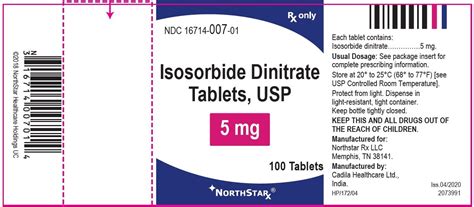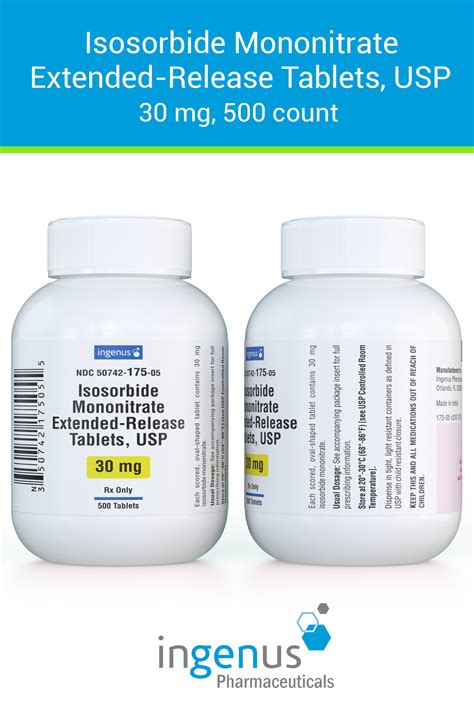Intro
Discover the 5 Isosorbide side effects, including dizziness, headaches, and digestive issues, and learn how to manage them with proper medication and lifestyle adjustments, minimizing risks and maximizing heart health benefits.
Isosorbide is a medication commonly used to treat angina pectoris, a condition characterized by chest pain or discomfort due to coronary heart disease. It belongs to a class of drugs known as nitrates, which work by relaxing and widening blood vessels to improve blood flow to the heart. While isosorbide can be effective in managing angina symptoms, it can also cause a range of side effects. Understanding these side effects is crucial for patients to make informed decisions about their treatment and to minimize potential risks.
The importance of being aware of isosorbide side effects cannot be overstated. Patients who are well-informed about the potential adverse effects of their medications are better equipped to manage their conditions effectively and to seek medical help when necessary. Moreover, recognizing side effects early on can help prevent more serious complications from developing. With the increasing prevalence of coronary heart disease, the use of isosorbide and other nitrates is likely to continue, making it essential to discuss their side effects in detail.
Isosorbide, like other medications, affects individuals differently, and not everyone will experience side effects. However, for those who do, it's crucial to understand the nature of these effects, their severity, and how they can be managed. This knowledge not only enhances patient safety but also improves treatment adherence, as patients are more likely to continue with a treatment regimen if they feel informed and supported. In the following sections, we will delve into the common and less common side effects of isosorbide, exploring their causes, symptoms, and management strategies.
Common Side Effects of Isosorbide

The most frequently reported side effects of isosorbide include headache, dizziness, and lightheadedness. These effects are primarily due to the vasodilatory action of the drug, which can lead to a sudden drop in blood pressure. Other common side effects may include nausea, vomiting, and flushing of the skin. These symptoms are usually mild to moderate and may diminish as the body adjusts to the medication. However, if they persist or worsen, patients should consult their healthcare provider for advice.
Headache and Dizziness
Headache and dizziness are among the most common side effects experienced by patients taking isosorbide. These symptoms can range from mild to severe and are thought to be related to the drug's effect on blood vessels. By widening blood vessels, isosorbide can lead to changes in blood flow, which may cause these symptoms. Managing these side effects often involves adjusting the dose of the medication or the frequency of administration. In some cases, healthcare providers may recommend additional medications to alleviate these symptoms.Less Common Side Effects of Isosorbide

While less frequent, isosorbide can also cause a range of less common side effects. These may include allergic reactions, such as rash or itching, and more severe hypotension, which can lead to fainting. Some patients may experience a condition known as methemoglobinemia, characterized by an abnormal amount of methemoglobin in the blood, which can lead to symptoms like cyanosis (a bluish discoloration of the skin) and shortness of breath. It's essential for patients to be aware of these potential side effects and to seek medical attention immediately if they occur.
Methemoglobinemia
Methemoglobinemia is a rare but potentially serious side effect of isosorbide. It occurs when there is an excessive amount of methemoglobin, a form of hemoglobin, in the blood. Methemoglobin cannot effectively release oxygen to body tissues, leading to tissue hypoxia. Symptoms of methemoglobinemia can include shortness of breath, dizziness, headache, and cyanosis. If suspected, methemoglobinemia requires immediate medical attention, as it can be life-threatening if not treated promptly.Managing Side Effects of Isosorbide

Managing the side effects of isosorbide involves a combination of dose adjustment, lifestyle modifications, and, in some cases, additional medications. For common side effects like headache and dizziness, patients are often advised to start with a low dose and gradually increase as needed and under medical supervision. This approach can help minimize the risk of severe hypotension and reduce the incidence of other side effects. Lifestyle changes, such as avoiding alcohol, standing up slowly to prevent dizziness, and staying hydrated, can also help manage side effects.
Dose Adjustment
Dose adjustment is a critical strategy in managing the side effects of isosorbide. By starting with a low dose and gradually increasing it, healthcare providers can help minimize the risk of adverse effects while still achieving the desired therapeutic effect. This approach is particularly useful for patients who are new to isosorbide or those who have experienced side effects with other nitrates. The key is to find a balance between efficacy and tolerability, ensuring that the benefits of the medication outweigh its risks.Conclusion and Future Directions

In conclusion, while isosorbide is an effective medication for managing angina pectoris, it is not without its side effects. Understanding these side effects, from common symptoms like headache and dizziness to less common but potentially serious conditions like methemoglobinemia, is essential for patients and healthcare providers alike. By being informed and proactive, individuals can better manage their treatment, minimize risks, and improve their quality of life. As research continues to evolve, it is likely that new strategies for managing isosorbide side effects will emerge, further enhancing patient care and outcomes.
Final Thoughts

As we reflect on the side effects of isosorbide, it's clear that education and awareness are key. Patients who are well-informed about their medications are more likely to adhere to their treatment plans and to recognize potential issues early on. Healthcare providers play a critical role in this process, offering guidance, support, and personalized care to each patient. By working together, we can optimize the use of isosorbide and other nitrates, improving the management of angina pectoris and enhancing the well-being of those affected by coronary heart disease.
Encouraging Engagement

We invite readers to share their experiences with isosorbide, including any side effects they have encountered and how they managed them. Your stories can provide valuable insights and support to others who may be facing similar challenges. Additionally, we encourage healthcare professionals to contribute their expertise, offering tips and strategies for minimizing the risks associated with isosorbide. By engaging in this discussion, we can foster a community of support and knowledge, ultimately improving patient care and outcomes.
What are the most common side effects of isosorbide?
+The most common side effects of isosorbide include headache, dizziness, and lightheadedness, primarily due to its vasodilatory action.
How can I manage the side effects of isosorbide?
+Managing side effects involves dose adjustment, lifestyle modifications, and, in some cases, additional medications. It's essential to work closely with your healthcare provider to find the right balance for your treatment.
What should I do if I experience severe side effects while taking isosorbide?
+If you experience severe side effects, such as methemoglobinemia or severe hypotension, seek medical attention immediately. These conditions can be life-threatening if not treated promptly.
